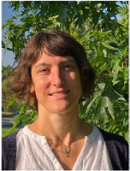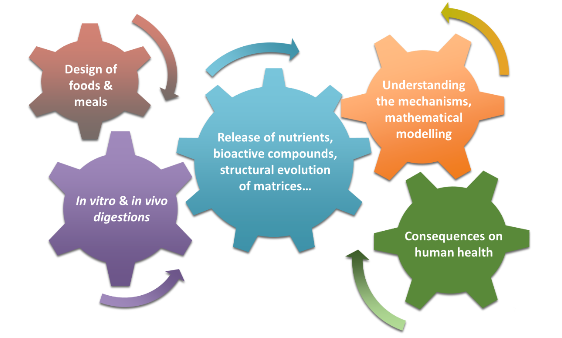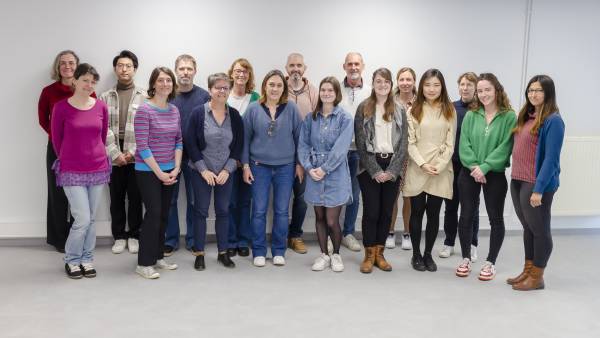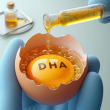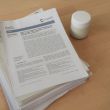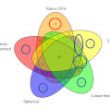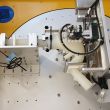Our objectives
The "Bioactivity & Nutrition" team is interested in the mechanisms of food digestion, and more particularly in:
- Understanding the deconstruction of dairy, egg and mixed animal-vegetable products in the gastrointestinal tract and evaluating their nutritional qualities
- Identify the release of bioactive molecules (beneficial or deleterious) during digestion
- Determine the consequences on human health
These aspects are essential to enable the design of multifunctional food matrices that meet targeted nutritional objectives.
Our strategies
In vitro approaches:
- Static & semi-dynamic digestions to screen between various food formulations, study enzymatic mechanisms, evaluate final digestibility, conduct investigations with in situ monitoring by MRI, Synchrotron, etc.
- Computer-controlled dynamic digesters that reproduce the flows (secretions, transit, etc.) observed in vivo:
- 2 DIDGI (1 equipped with membrane filtration)
- 1 NERD-T (which mimics the biomechanics of the digestive tract)
- Cellular models of the intestinal wall to study nutrient absorption
In vivo approaches: Pre-clinical and clinical studies.
In silico approaches: Mathematical modelling of the mechanisms.
Different populations considered: Infants, healthy adults, elderly...
Our expertise
Our expertise covers the following disciplines:
- Food science
- Protein and lipid biochemistry
- Digestive physiology
- Human nutrition
- Physical chemistry and biophysics
In addition to our digestion simulators, the team has a multitude of investigation means at its disposal to monitor food digestion:
- Analysis of hydrolysis products :
- Proteolysis: peptidomics by LC-MS, amino acids by ion exchange chromatography, SDS-PAGE, primary amines by OPA...
- Lipolysis: different classes of lipids by GC-MS, GC, HPLC, TLC...
- Amylolysis: oligosaccharides and released sugars by HPLC, UV kits...
- Confocal microscopy
- Cell culture
- Rheology
- Mathematical modelling
Our team
Technician/Assistant engineer : Séverine CHEVALIER, Gwénaële HENRY, Yann LE GOUAR
Engineer : Marie-Françoise COCHET, Julien JARDIN, Olivia MÉNARD, Jordane OSSEMOND
Scientists : Amélie DEGLAIRE, Didier DUPONT, Catherine GUÉRIN, Steven LE FEUNTEUN, Vincent MATHIEU, Martine MORZEL, Françoise NAU, Frédérique PEDRONO
Our PhD and post-doctoral students
- BOJORQUEZ SANCHEZ Ana María (PhD) - Supervision: PEDRONO Frédérique et LE FEUNTEUN Steven - 2025 - Vectorization of DHA in the form of AKG-diDHA and measurement of early neurodevelopmental effects in infants after transmission through breast milk
- GONZALES-NIETO Elva-Zenaida (PhD) - Supervision: DUPONT Didier - 2025 - In vitro gastrointestinal digestion of plant-based foods using the INFOGEST method and brush border enzymes: a tool for predicting the allergenicity of new foods
- LE BLET Manon (PhD) - Supervision: MORZEL Martine. Projet Letsproseed - 2025 - Allergenicity and digestion of fava bean-based products
- LE FOLL Rozenn (Post-doc) - Supervision: DUPONT Didier & CROGUENNEC Thomas - 2025 - Is the bioavailability of calcium in dairy products higher than that in various plant-based food sources?
- COULIBALY Amadou (PhD) - Supervision: MORZEL Martine - 2024 -Interactions between proteins and polyphenols during gastrointestinal digestion
- PICARD Capucine (PhD) - Supervision: NAU Françoise, DEGLAIRE Amélie and LECHEVALIER Valérie - 2024 - Predicting the nutritional quality of plant proteins for the purpose of enriching biscuit products with protein
- SAVIARD Tanguy (PhD) - Supervision: DUPONT Didier - 2024 - Understanding goat milk digestion and its impact on gastrointestinal homeostasis through in vitro and in vivo approaches
- JAYAWARDANA Isuri (Post-doc) - Supervision: DEGLAIRE Amélie and DUPONT Didier - 2023 - Gastrointestinal digestion of milk flavored with tea, cocoa, and coffee: gastric colloidal behavior and protein digestion kinetics.
- POGU Simon (PhD) - Supervision: DEGLAIRE Amélie, DUPONT Didier and NAU Françoise - 2023 - Which in vitro methodology can be used to predict values obtained in humans for actual protein digestibility?
- LE FOLL Rozenn (Post-Doc) - Supervision: DUPONT Didier (BN) /CROGUENNEC Thomas (PSF) - 2024-2026 - Is the bioavailability of calcium in dairy products higher than that in various plant-based food sources?
- MOUCHARD Alizé (Fixed term contract) - Supervision: DUPONT Didier - 2025-2026 - Digestion of new foods and ingredients enriched with cultivated macroalgae proteinsDigestion de nouveaux aliments et ingrédients enrichis en protéines de macroalgues cultivées
- FINIZIO LAURANE (Fixed term contract) - Supervision: DUPONT Didier - 2025 - Determination of the in vitro digestibility of proteins in pea and fava bean isolates
Projects
INFOGEST: An international research network (a former COST Action : 2011-2015) whose objective is to improve health properties of food by sharing the knowledge on the digestive process. Altogether, INFOGEST gathers more than 715 scientists from 250 institutes in 56 countries in Europe but also USA, Canada, Argentina, Australia, New Zealand etc. Click here for more information
ALINOVEG : This project, supported and funded by BPI France, focuses on developing alternatives to dairy products based on pea and fava bean proteins. As part of this, the digestibility of these proteins will be studied.
ALKYLAIT : This thesis project focuses on the vectorization of DHA in the form of alkylglycerols in the mother's diet. The early neurodevelopmental effect in offspring after transmission through breast milk will be studied in a mouse model. This project is funded by the Institut Agro Rennes-Angers and the Brittany region.
ALLPRET : This project, coordinated by Utrecht University (University Medical Center Utrecht), is a doctoral network funded by the European Horizon - Marie Curie program. The overall project focuses on assessing food safety when introducing new foods into the human diet, in particular by evaluating allergenic risks. The thesis carried out at STLO will focus on the gastrointestinal digestion of plant-based foods and the addition of brush border enzymes as part of the assessment of the allergenicity of new foods.
DIRPROT : This thesis project focuses on the methodology used to evaluate the in vitro digestibility of proteins. It is a collaboration with the PNCA joint research unit (Palaiseau), funded by Carnot Qualiment and the TRANSFORM department of INRAE.
GLUT : This project focuses on the digestion of milk flavored with coffee, tea, or chocolate extracts. The behavior in the gastric phase, during simulated digestion with the NERD-T® simulator, is studied, as well as the kinetics of proteolysis and structural changes. This project has received European and Breton co-financing from the BIENVENüE program.
LETSPROSEED: In this project, funded by ANR and lead by UMR Agroécologie (Dijon, France), we are in charge of the WP on Salivary protein-polyphenol complexes: interactions, fate during in vitro digestion and impact of digestates on the mucin layer lining the intestinal epithelium (mixed Caco2/HT29-MTX cell cultures). This task is performed in collaboration with UMR CSGA (Dijon, France) and UR BIA (Team Polyphénols, Réactivité, Procédés, Le Rheu, France).




